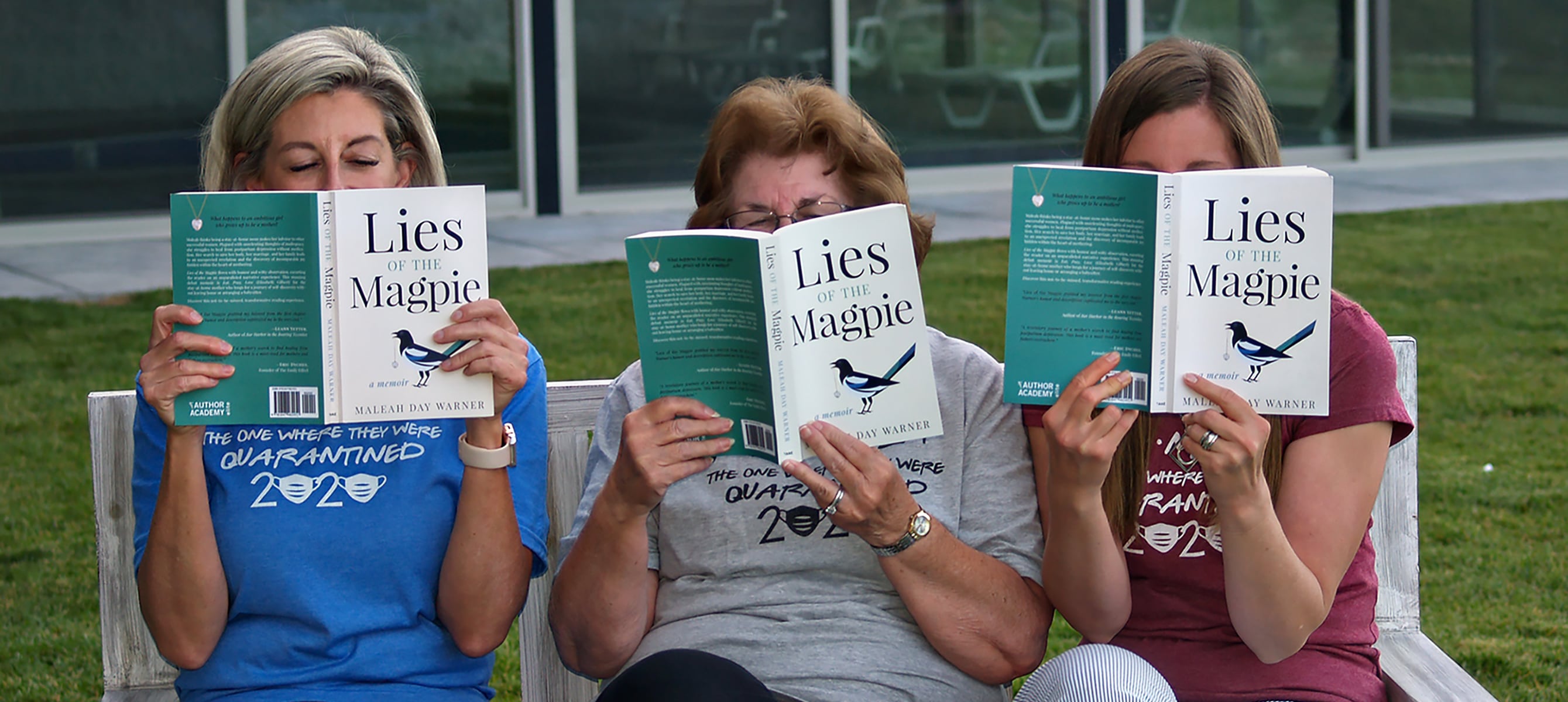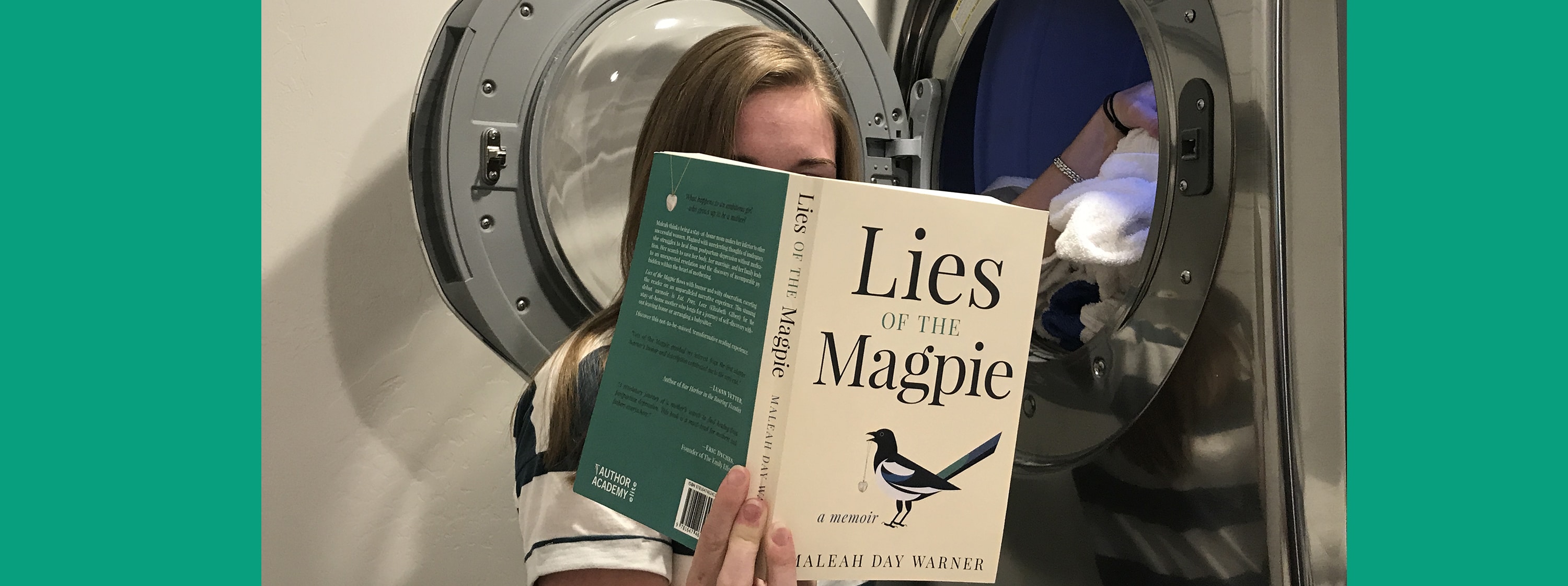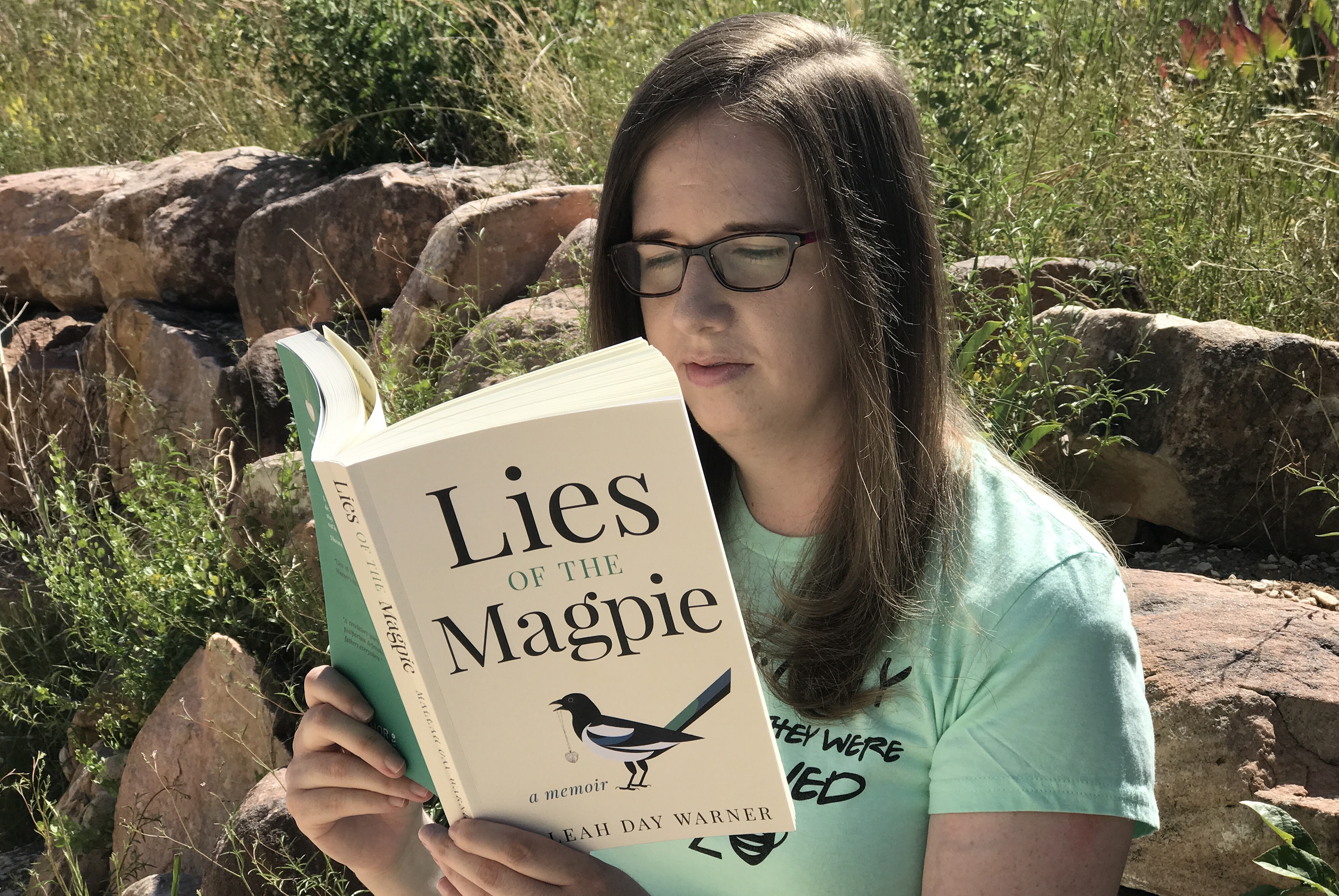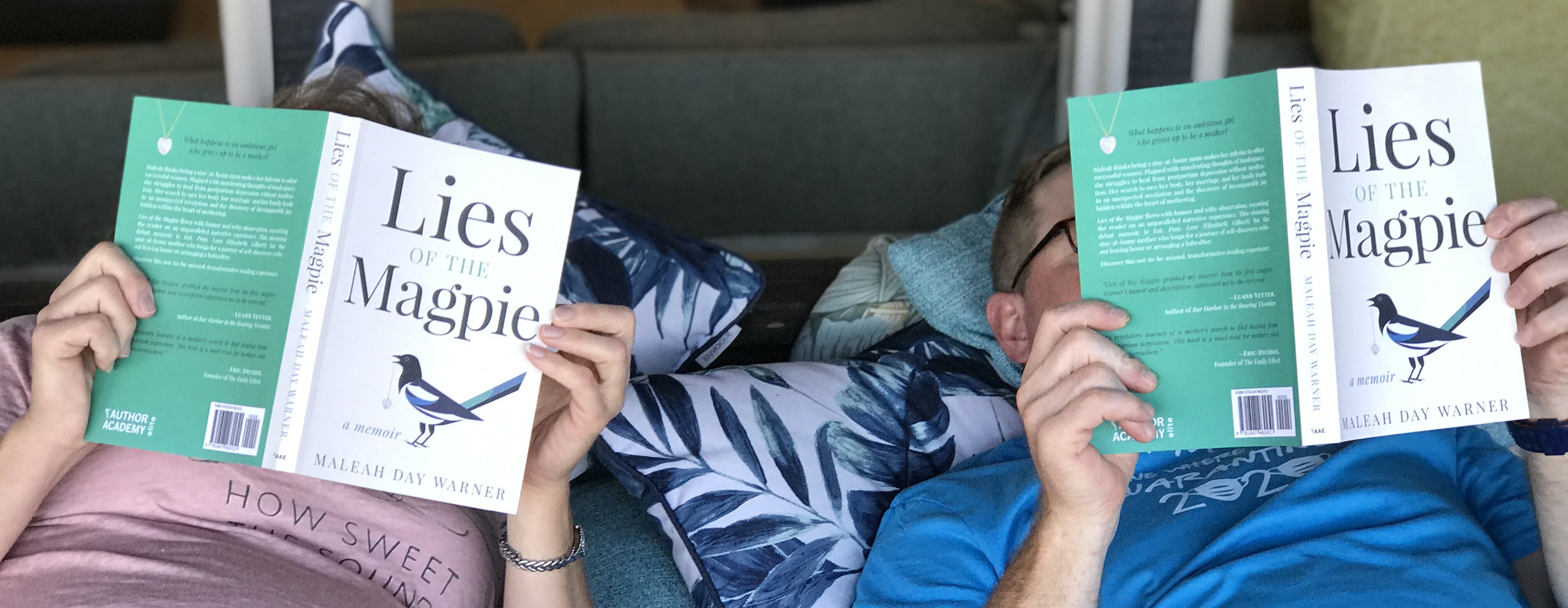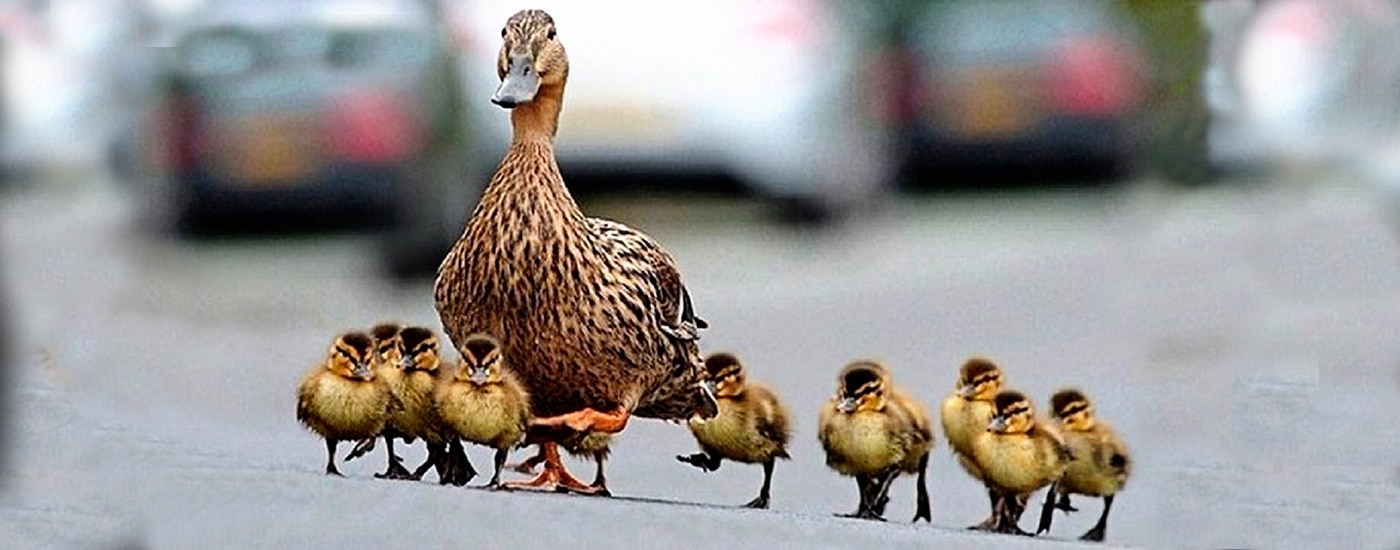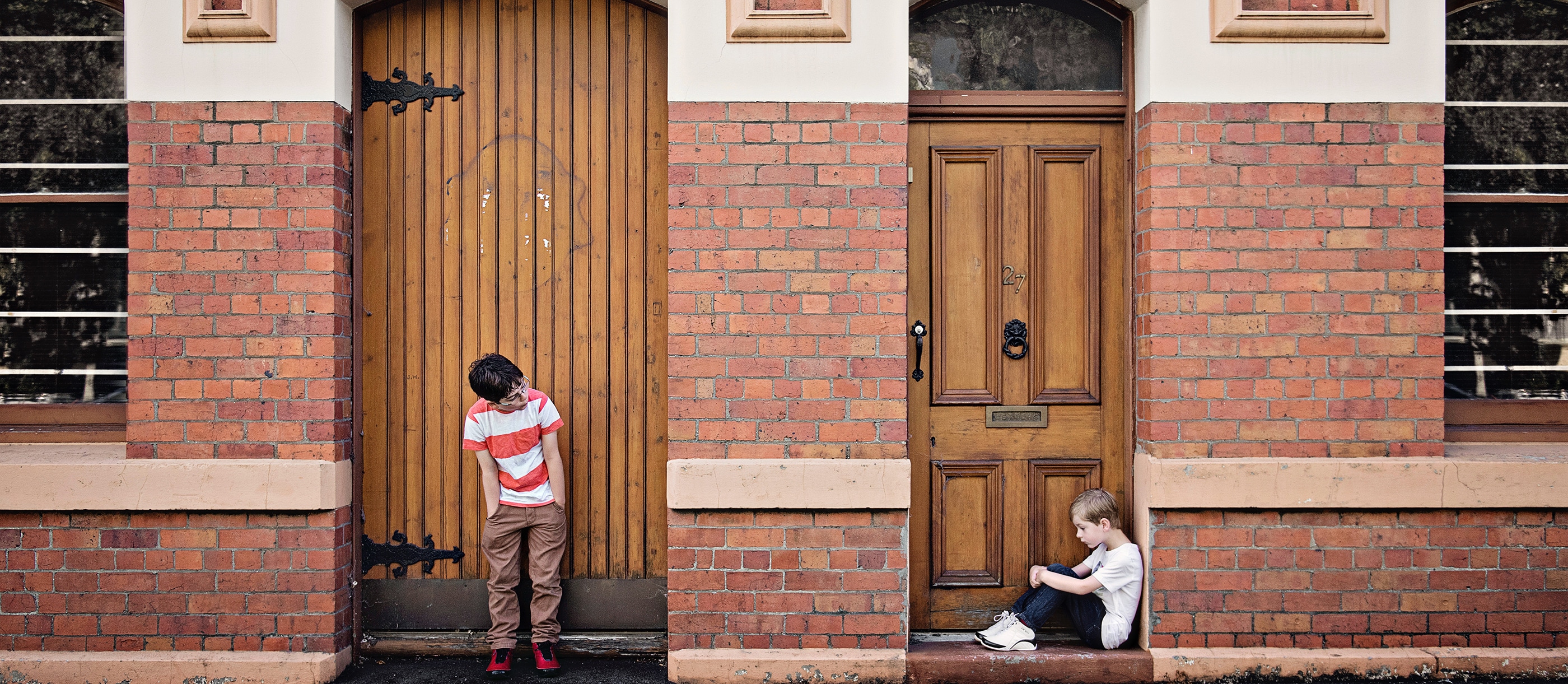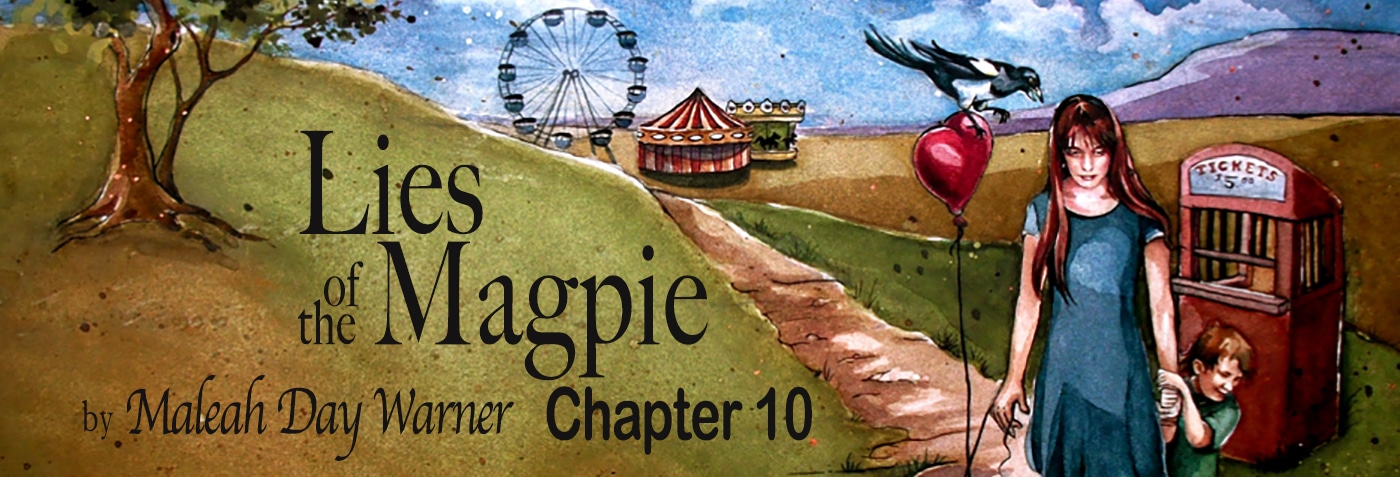Podcast: Play in new window | Download
Subscribe: Apple Podcasts | Google Podcasts | Spotify | Email | RSS | More
Podcast: Play in new window | Download
Subscribe: Apple Podcasts | Google Podcasts | Spotify | Email | RSS | More
Ep. 91 Have you ever found yourself in a No-Win Pickle? This is the term I use to describe a situation where no matter what you do, no matter how hard you try, despite your good intentions you cannot win. I found myself in a No-Win Pickle after my 4th baby was born. Today I’m sharing that story along with 3 tools for managing this Failure Paradox.
A more official-sounding term for the No-Win Pickle is The Failure Paradox. My 4th son was born in the early morning hours on the day of my oldest son’s kindergarten graduation. But that wasn’t a problem. I slept a few hours, got up and showered and put on makeup and shoes ready to go. Danny’s school was a few blocks from the hospital and I figured the kind nurses wouldn’t mind keeping an eye on baby Jack while I dashed out for an hour to catch the graduation and return in time for Jack’s next feeding. Obviously, my postpartum mind wasn’t considering that hospitals have policies about new mothers leaving (child abandonment) and returning (germ exposure). I was simply trying to multitask and fit everything onto my calendar.
When the nurse raised her eyebrows at me, I realized that I would be missing Danny’s big event. And he only graduates from kindergarten once in his whole life! Because of taking care of one child, I was neglecting the other. I should have timed Danny’s birth better. I felt like a total failure as a mother.
This was my first big experience with the No-Win Pickle, which I’ve encountered dozens of times since. Basically, the No-Win Pickle is when, no matter how hard you try, you will never be able to succeed at everything. I hate that it is impossible for me to succeed at everything in mothering. I hate that I have to make impossible decisions which sometimes require choosing one child over another, or choosing myself over my children, or choosing none of us. To be a “good mother” equally for all. To never choose one over the other.
The Failure Paradox
Paradox: a statement or proposition that, despite sound (or apparently sound) reasoning from acceptable premises, leads to a conclusion that seems senseless, logically unacceptable, or self-contradictory.
The Failure Paradox: In our failure, we rise to higher levels.
Lorem ipsum dolor sit amet, consectetur adipiscing elit. Ut elit tellus, luctus nec ullamcorper mattis, pulvinar dapibus leo.
Lorem ipsum dolor sit amet, consectetur adipiscing elit. Ut elit tellus, luctus nec ullamcorper mattis, pulvinar dapibus leo.
Lorem ipsum dolor sit amet, consectetur adipiscing elit. Ut elit tellus, luctus nec ullamcorper mattis, pulvinar dapibus leo.
Podcast: Play in new window | Download
Subscribe: Apple Podcasts | Google Podcasts | Spotify | Email | RSS | More
Ep.84 Listen to the pinnacle chapter of Lies of the Magpie. Maleah’s struggles and months of searching for how to heal her body finally come together in an unexpected way. Did you predict this twist?
Podcast: Play in new window | Download
Subscribe: Apple Podcasts | Google Podcasts | Spotify | Email | RSS | More
On Ep.83, you can listen to chapters 38 & 39 of Lies of the Magpie by author Maleah Day Warner.
Podcast: Play in new window | Download
Subscribe: Apple Podcasts | Google Podcasts | Spotify | Email | RSS | More
Ep. 81 In Ch 34 & 35 of Lies of the Magpie, Maleah is desperate to find help for healing her body, and following the recommendation of friends, she visits a homeopathic doctor in her area.
Podcast: Play in new window | Download
Subscribe: Apple Podcasts | Google Podcasts | Spotify | Email | RSS | More
Ep. 80 Listen to these FREE sample chapters from the best-selling memoir Lies of the Magpie by Maleah Day Warner. In these chapters, Maleah questions whether she is “sick enough” to merit seeing a doctor. The challenge is that she isn’t bleeding, bruised, or having any specific pain. She knows she doesn’t feel “right,” but struggles to put what is wrong into words. She is terrified the doctor will say it’s “depression.” For Maleah, depression isn’t a legitimate illness, but rather a judgment of a person’s weak character. Maleah thinks she would rather get a cancer diagnosis than be told she has postpartum depression. In the end, her diagnosis isn’t at all what she expected, and will create more complications and confusion as the story progresses.
Podcast: Play in new window | Download
Subscribe: Apple Podcasts | Google Podcasts | Spotify | Email | RSS | More
Ep 40 I LOVE artists. Today I’m sharing stories of how five artists have colored my life.
I’m grateful for anyone who creates and shares on any level. It doesn’t matter if it’s amateur or professional, hobby or full-time gig. Fro me, art is the sauce of life. When I lived in France, I learned that the secret to delicious French food is the sauce. Without art, life would be like plain mashed potatoes or dry chicken—you get the basic nutrition, but it’s the sauce that adds the spice, the flavor, and makes everything taste so good.
“Art and love are the same thing: It’s the process of seeing yourself in things that are not you.”
― Chuck Klosterman
Years ago my husband and I went on a campout with other young married couples from our church. One man from our group performed a magical comedy routine while we sat around the campfire. I laughed so hard that my belly hurt for three days. It was awesome. This wasn’t something he did professionally. He was going to college like the rest of us, probably studying bio-engineering or something rather serious. I can’t remember what got him interested in magic and comedy or why he had taken the time to learn the skill. But I remember feeling grateful that he had taken the time to hone that talent and that he would share with us and not be embarrassed about it. Twenty years later I still remember that night of entertainment.
I love comedians. I love humor. You know those friends you love to be around because they are funny. They have a unique way of seeing and saying life. You never know what is going to come out of their mouth, but you know that when you’re around them your belly is going to hurt, in a good way. I’m really grateful for people with a good sense of humor. I think humor is an art.
Accents. I love accents. Real or imitation. With the internet and social media, our world is becoming more monochromatic. And I like that around the world we realize that we are more similar than different. But I hope we don’t lose our accents. I have a friend who can shift into accents on a dime and it’s hilarious. I love conversations when she gets in a mood and suddenly I’m having an international conversation with an Irish lady or German man. I don’t know why. It’s just so colorful and entertaining. I think being able to do accents is an art.
Of course I love writers. It took me awhile in my writing journey to think of myself as an artist. What finally gave me that AHA! was realizing how similar my writing process was to learning piano. Both required that I to sit my but in a chair for at least an hour every day and plunk away at the keys. And at first what came out wasn’t very pretty. However, little by little over time it got better. Aha! Creating art, developing an artistic skill requires practice. Daily practice.
I could go on and on about writers I love, books that have changed my life. I want to mention artists who create for children. Thank the heavens, truly, for artists who create for children. I don’t know how I would have survived mothering without Dr. Seuss. Other favorites are Betsy Lewin’s Click Clack Moo, Cows that Type and Doreen Cronin’s Diary of a Worm. How about the gorgeous language and illustrations of Don and Audrey Wood in “The Napping House” and “King Bidgood’s in the Bathtub.”
For me, life without artists would be a black and white outline. A blank coloring book. When I look back on life, on raising young children, it is our encounters with art that added the color to our pages.
I feel this way about nature, which makes sense because God is the great artist and an encounter with nature is to experience art.
I feel extreme gratitude for artists who create clever, engaging, fun music for children. I’m not talking here about a run-of-the-mill CD of Mary Had a Little Lamb sung to a strum guitar. Sorry nursery rhyme album recorders that sound like you hired Donna Reed to sing straight from the book of Mother Goose accompanied by a few basic piano chords. I suppose you have your place in the world, and you are certainly better than nothing. But goodness, if I had to listen to your menu in the car one more time, I would have parked at the drive-through of the crazy house and checked myself in.
And Kidz Bop? PLEASE. With your aerobicized Top 40 synthetic, auto-tuned, lip sync! Have mercy on us mothers whose mental faculties are already as fragile as the thread of Justin Beiber’s relationships.
I said I would name five of my favorites artists, so I will. But choosing five is HARD! Much harder than naming five of my favorite children, which I can do without hesitation. BUT, choosing five favorite artists is much more difficult. I’m mentioning these five because they have come into my life during a transition or when I needed comfort or uplift. Their creativity, their art became the soundtrack of my life at that time.
I owe any strand of musical mental fortitude remaining to John Lithgo and his children’s album Singing in the Bathtub. Thank you, John Lithgo, for witty lyrics, catchy tunes, and comedic poetry set to music. How a Tony and Emmy-winning performer ends up creating children’s stories and music, I don’t know. You didn’t have to do it. You didn’t need to do it. And yet you did. For this I say THANK YOU, and I mean it. Friends with kids, if you want a squirt of fun in your day, ask Alexa to play John Lithgow’s album Singing in the Bathtub or YOUTUBE it. Our personal favorites were From the Indies to the Andies in His Undies and Big Kids Scare the Heck out of Me. I don’t love the Triplet song, but in light of the exceptional, over-the-top fun of the other 13 tracks, I can forgive track #7.
And my thanks to a public library, the lovely building that houses all this art for free. The best price for young families who have more toddlers show up to the dinner table than they have dollars in the bank account. Each of the books, and music CDs I mention we discovered through our public library.
In 2001 Josh Groban released his first album including track #5 “To Where You Are.” When my brother passed away that year, I would get in the car by myself and play Track #5 over and over, crying and feeling my brother close to me. I had never heard the song when I purchased this CD; it wasn’t the reason I bought the CD. That’s how I know that artists, teachers, mentors come into your life when you’re ready and seeking. That song was the wings of my healing. It carried and soothed me. I don’t know how anyone could ever heal through grief without music.
While Josh Groban performed the song “To Where You Are,” it is especially the writers who need acknowledgement. Do you know who wrote the song? Richard Marx! Yes. The Richard Marx of “Right Here Waiting for You” fame. As well as Linda Thompson, who I don’t know anything about, but I’m sure she’s lovely.
Voice Male is an an a capella group consisting of six men who have performed together for twenty five years, since they first met in their college choir. It’s their improv slapstick humor and witty asides during concerts that endear them to me. Also, the fact that I’ve known them since college.
What I love about Voice Male, in addition to their unique arrangements of popular songs and original compositions, is the energy and relationship of their group. I appreciate that these six guys really go out of their way to keep creating and performing art. They each have day jobs and live in different states. When one of the original members passed away from cancer, it would have been easier to call it quits. They have wives, kids, and mortgages. And, they continue to make it work to do concerts, put out albums, and create art. What’s more? They’re getting old. I know because they are my age!
I don’t get a kickback for mentioning them. They don’t even know I’m talking about them. They probably don’t even remember me. But I can without reservation recommend that, if at all possible, you see them live in concert. Our favorite albums are Kids Stuff or their Christmas albums Jingles 1 or Jingles 2. They also produce beautiful arrangements of sacred hymns.
Voice Male has been the soundtrack to our family gardening projects and the background music each December when we set up our Christmas tree. Their songs are my favorite background music to my annual Christmas Card Videos.
I remember not too long ago seeing a flyer advertising a performance by John Schmidt. Tickets were $30 for his outdoor concert at Thanksgiving Point in Lehi, Utah. I wanted to take my husband for date night, but we had something else that weekend. Now John Schmidt and The Piano Guys are selling out stadiums and tickets are four times as much. I missed my chance to see him perform his original composition, Waterfall, in front of the actual waterfall at Thanksgiving Point Gardens.
Lindsey Stirling has a similar story. She performed in local venues until AGT judges told her she wasn’t a talented enough violinist and that her act wasn’t strong enough to make it on her own.
For both John Schmidt and Lindsey Stirling it would have been easier for them to not pursue their art. Their acts certainly weren’t mainstream. They were probably not going to get picked up by a major record label. “Don’t give up your day job,” was probably sound advice. The Piano Guys were doing classical music. Nobody pays money for classical music. We fill sports stadiums and pay out enough ticket money to give rookie athletes million dollar salaries. But all our symphonies and art programs are subsidized. But I’m so glad they didn’t listen. I’m so grateful they didn’t quit. I love that they sell out sports stadiums.
I am a daily beneficiary of their creative artistic endeavors. Every morning I listen to Lindsey Sterling and the Piano Guys. They are both on my morning yoga playlist. I’m grateful for their hard work, their perseverance. I’m grateful they fought through the self-doubt and public doubt and brought their art into the world.
Both Lindsey Stirling and The Piano Guys have shown that becoming an artist is about tapping in to what you have unique to offer the world and becoming more of who you are.
I grew up in the 1980s listening to my older brother’s cassette tape recordings of ABBA’s albums and rewinding to my favorite tracks Dancing Queen, Super Trouper, Take a Chance, and Money, Money. ABBA was the soundtrack of my awkward tween years.
Then, what I find truly genius is that playwright Catherine Johnson found a way to take a string of unrelated songs and mold them into a story. I admit that to me the plot sounded a bit scandalous—a young girl afflicted with back-to-back sleep overs and three potentials fathers. I never say the musical, but when the movie came out—well, I will watch anything with Meryl Streep. And I LOVED it.
Next, imagine the genius required to take all the leftover ABBA songs and create a believable, unique, and even more lovable prequel. When Mamma Mia Here We Go Again came out, I was helping my oldest daughter pack to move away to college. We took a break from packing and wen to the theater and laughed and cried. The ending scene between mom and daughter was particularly poignant.On the drive to college, we blasted ABBA music full power. That movie and all its glorious music became the soundtrack for the story of my daughter growing up and leaving home for the first time.
Then (and how cool is this?), for Homecoming her university had an ABBA tribute band and she got to rock out live with her college friends. It’s like the gift that keeps on giving. And through this all I kept thinking how grateful I am for artists who create what literally becomes the soundtrack to our lives.
“A man should hear a little music, read a little poetry, and see a fine picture every day of his life,
in order that worldly cares may not obliterate the sense of the beautiful which God has implanted in the human soul.”
― Johann Wolfgang von Goethe
Podcast: Play in new window | Download
Subscribe: Apple Podcasts | Google Podcasts | Spotify | Email | RSS | More
Ep. 38 This episode is all about STRESS and how to NOT feel stressed. The goal is to understand that it IS possible to have a lot on your plate and to NOT feel STRESSED about it. Listen to learn POWERFUL thoughts to help you to NOT feel STRESSED.
So often we believe that we have so much to do and not enough time to do it all. We believe ALL the things are so important and we worry that our effort won’t be good enough. Therefore, we end up panicked and stressed, which actually freezes us and limits our ability to finish ALL the things. We end up working frenetically, staying up late, getting sick, but not finishing the tasks.
I promise that life does NOT have to feel STRESSFUL. It is entirely possible to have a lot on your plate and to NOT feel STRESSED about it. You can have an amazing life and be engaged in purposeful work and move forward through accomplishments and success steps and never feel stressed.
If you think this can’t possibly be true, that I’m exaggerating, then this is going to be an excellent episode for you. I’m glad you’re here.
Let’s talk about Why We Feel Stress:
Every emotion comes from thoughts. Every. Single. One. It’s not possible to have an emotion that wasn’t triggered, that wasn’t created by a thought in your head.
Now, that thought in your head doesn’t necessarily have to be your own thought. Other people can put thoughts in your head, dark spirits can put thoughts in your head, TV/media/billboards can put thoughts in your head. Sometimes this can be frustrating because we can’t always control what thoughts pop up in our minds, but can control how we think about, how we react to those thoughts. In any case, the emotions we feel always derive from a thought.
I’m not saying this to chastise or belittle anyone for experiencing stress. I feel stress at times, not too often these days, but I used to live in a chronic state of stress. And it’s not fun. Stress is a real kill-joy, it sucks the bliss out of life and makes you not a very pleasurable person to be around. Not to mention that it can make you really sick.
Let’s look at some of the thoughts that lead to us feeling stressed.
You feel the crunch of the deadline. The calendar days are turning, the clock is ticking, and you are running out of time. This is a common thought. I think we’ve all been here, probably several times already today.
This is the thought of either “I’m not good enough” or “What I’m doing isn’t good enough.” This is where perfectionism comes to roost. This thought is a relative of the thought of not having enough time, because usually we are afraid that we don’t have enough time to make our work be good enough. We fear our imperfections and weaknesses and so often we allow our subconscious to make it be about time, when in truth, it’s about fear of not being good enough.
I’ve practiced noticing when I’m feeling stressed and following that feeling, like a detective hunting for clues, back until I discover the thought triggering the stress. Then, I’ve found it helpful to ask questions: Is this thought true? Or, is this a useful thought?
I discovered this tool of discovering and questioning thought when I was searching for healing from postpartum depression and autoimmune disease. This is when I realized that my thoughts were the roots of so many of my so-called problems and stress and that my sickness stemmed from my toxic thoughts. Most everything that I talk about on this podcast comes down to what’s going on in our heads. If there’s one thing you get out of this podcast, or any of these podcasts, if you learn to question your thoughts, that skill alone will launch your life in powerful ways.
Let’s do it. Let’s question these thoughts.
Thought: “I don’t have enough time.”
There are so many ways your brain can verbalize this. I’m so busy. I can’t do it all. I have too much to do, thus I don’t have enough time.
Challenge: Is it TRUE that I don’t have enough time?
Instead of going into a huge existential discussion about what is TRUTH, let’s skip to the understanding that when it comes to your life, you get to create your truth. It’s a gift called Free Agency. So I would ask, Do I want this to be true for me that I don’t have enough time?
I can choose to believe that it’s true and my brain will be extremely skilled at finding evidence to support why I don’t have enough time. Or, I can choose to say it’s not true. I can choose to think that I have plenty of time. I have SO much time. Time is an unlimited commodity. I can use time today and I will have more tomorrow. I can use tomorrow’s time and I will have more time the next day. It’s amazing!
For so long, self help people have pushed this idea, this “thought” that time is a precious, and limited commodity. Get it done today because there are no guarantees for tomorrow! And it’s true you could die at any moment. But still, I believe that death is not the end of me, that I will go on living and have, get this, even MORE time! More time to learn, progress, experience, etc. When my brain throws up that idea that I don’t have enough time, I challenge it and I argue for all the reason why I have an abundance of time.
I’ve never found a scenario where the thought “I don’t have enough time” is a useful thought. It doesn’t serve me well. The panic of running out of time makes my insides contract, it freezes me up, and it drains my power to take action. Ironically this thought of not having enough time actually leads to procrastination rather than prevents procrastination.
Replace: What to Think Instead
I have plenty of time.
I have exactly enough time.
I have an abundance of time.
I have exactly enough time to accomplish all the things that are important to me
For Full Text Listen to the Podcast
Podcast: Play in new window | Download
Subscribe: Apple Podcasts | Google Podcasts | Spotify | Email | RSS | More
The purpose of today’s Power Principle is to help us UNDERSTAND that chaos is part of organization, so that we can be more comfortable with periods of CHAOS and so that you can manage and springboard from those moments of chaos more skillfully.
I saw a YouTube video of a mama duck trying to stop her babies from falling down a storm drain. She worked feverishly to gather her scattered brood and nudge them to hop out of the gutter onto the step above. By the time she got the last duckling up the step, the other ducks were again scattered and she started the process over. Mrs. Duck, I can relate! I just get my kids settled into a school routine, then it’s summer break. I just get the last moving box unpacked and we move again. This cycle from chaos to order back to chaos could drive one crazy, UNTIL you understand that this cycle is an essential part of progress.
I want to assure you that when you find yourself in periods of chaos, you’re not doing anything wrong. (As long as it’s progressive chaos. There is a difference between progressive chaos and non-progressive chaos.)
“In the beginning . . . ” the Book of Genesis illustrates this pattern of chaos to order and back again. God took unorganized matter and created the earth. His six days of toil had barely ended when Eve ate the fruit and shifted the perfectly ordered life in the Garden into chaos. No sooner do Adam and Eve figure out how to labor for their livelihood and establish a good system when Cain slays Abel and their life is thrown into chaos again.
The flood. The enslaved children of Israel, I mean the only place on Earth that really stayed organized was the city of Enoch and God didn’t want that place to get messed up, so he picked it up and put it on the top shelf so the other earth kids wouldn’t break it.
Do you get the point? From the beginning of time, we have this pattern of chaos to order to chaos to order. We are designed to bring things from order to chaos, not just once, but over and over and over again.
The important point is that this cycle isn’t meant to be repetitive, but progressive.
Without periods of chaos, our lives would be stagnant. Chaos is what jumpstarts our learning and growth.
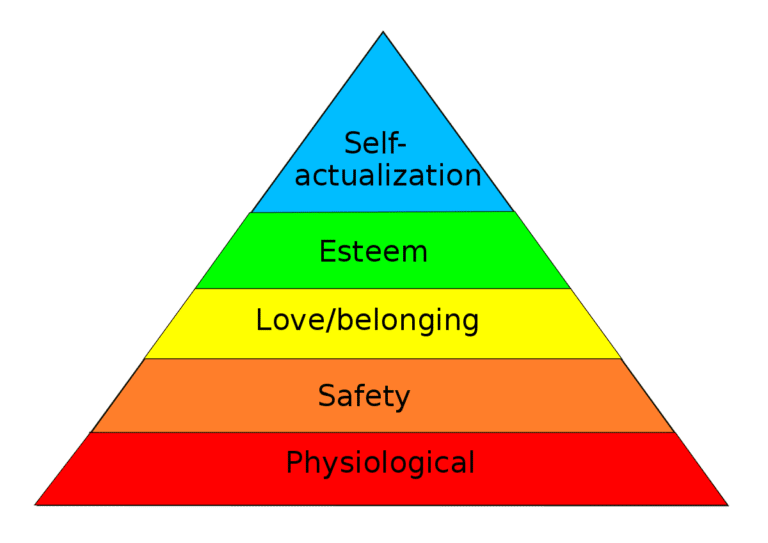
As we move through Maslow’s Hierarchy of Human Needs, we don’t stay indefinitely at the top of the pyramid. We don’t sit for eternity at Self-actualization. We go back to the beginning and start again, not repeating ourselves, but improving ourselves. On our next journey up Maslow’s pyramid, we upgrade each level. We improve the quality of our food, shelter, environment. We increase our sense of safety. We build deeper connective relationships. We deepen our sense of self identity and we further pursue our passions and purpose. Then will will go back to food and start all over again.
If you feel that you’re stuck in life, that you are running the hamster wheel but not moving forward, try going back to the basics. What is one way you can better fulfill your physiological needs? Can you upgrade your food and nutrition? Perhaps eat more raw vegetables, reduce sugar intake, quit smoking, take vitamins. Maybe you could get more sleep or clean out your closet and donate those old clothes that don’t fit. Something as simple as organizing the silverware drawer in your kitchen can energize you and jumpstart your progress up Maslow’s pyramid.
Now that you understand how periods of chaos are desirable and essential for our learning and growth, you will be better able to manage the chaos and used it as a springboard to move forward in life.
Good luck gathering your ducklings!
Podcast: Play in new window | Download
Subscribe: Apple Podcasts | Google Podcasts | Spotify | Email | RSS | More
How often do you hear you have to face your problems head-on?
Facing problems head-on sounds like the take-charge thing to do. I’m a proactive problem-solver and that means I’m going to take the bull by the horns, wrestle it to the ground, lasso its legs, stand up, raise my arms and declare victory.
But you’ve been around long enough—you’ve tried to solve problems this way—Darling, this ain’t your first rodeo, SO you know that at times our human existence is like living inside a China shop. One wrong move and you knock something valuable off the shelf. And if your approach to problem solving resembles wrestling a bull in a China Shop, well, you see what those results will be.
Miley Cyrus sums ups this approach with her lyrics, “You came in like a wrecking ball.” And take my word, trust me on this, you do NOT want a reenactment of THAT music video playing in your life.
Shattered things can be mended. China Shops can clean up after the bull runs through. Humans are actually quite repairable, but it’s always easier to not break something or someone in the first place.
Here are three Sidedoor Approaches to solve problems in a more effective way.
Keeps problem small by not giving them FRONT DOOR attention.
Maybe this problem doesn’t deserve Front Door attention. This little thing is a side-issue. Keep it small where it belongs and let more important things through the FRONT DOOR.
The side door is for intimate guests, right? Your family and closest friends come through the side door, so keep problems within your intimate circle. If we hang our problems on the front door like one of those seasonal wreaths, that’s the first thing people see about us. That’s how we get defined and identified, by our problems. Remember the saying: Don’t Deck the Halls with Your Follies.
A SIDEDOOR APPROACH resolves problems by dissipating conflict energy. As humans we are made of energy, everything around us is energy, everything we do and accomplish in life is energy. Most of the time we ignore it. We aren’t conscious of where our energy is directed or what we’re doing with it.
If I face a problem head-on, it’s Me vs The Problem. It’s a face-off. Opposing football teams line up this way, which is okay because they are there for a conflict. Old-time battles were fought head-on. Think of the term front line. If you were on the front line, you knew things weren’t going to go well for you.
One day I showed up to my church’s women’s group. The chairs were set up in two lines facing each other. The set-up was intended to foster discussion, but for some reason the entire lesson, I wanted to punch somebody. Someone would make a comment, and I wanted to argue.
Human energy Face to Face is naturally confrontational. It’s powerful and it’s repelling, like magnetic poles. Like I said, we are 90% of the time going through life unconscious of where we’re throwing our energy. It’s like giving a laser gun to a toddler.
During the Revolutionary War, the Colonists, with less ammunition and resources, won battles by not fighting head on. They found victory through “sidedoor” battle tactics.
Am I feeding conflict energy by approaching this head on?
Am I fueling negative energy by my approach?
Could a simple adjustment of my physical demeanor resolve the struggle?
What about a simple adjustment to my emotional energy.
Maybe the problem isn’t a problem. Maybe what (or who) you think is in your way, isn’t blocking you at all. Maybe you’re hitting up against this block over and over like a football player hitting against those tackling dummies. You think you’ve got to conquer this in order to move forward, so you keep ramming against it and it beats you down every time.
What if that ROADBLOCK doesn’t need your attention?
What if you can simply move around it?
What if the thing you BELIEVE is in your way, isn’t blocking you at all?
What if the only reason it’s a PROBLEM is because you’re fixated on it and you’ve gotten in the habit of hitting up against it over and over again?
What if all you need to do is look past it and move on?
I hope something here helps. There are a hundred different ways to apply these principles. Sometimes the best thing we can do is to neglect our problems and nurture our positives.
Listen to Full Episode by Clicking Play Button above.
Related Episodes: Episode 4 Permission to Make Life Easier
Podcast: Play in new window | Download
Subscribe: Apple Podcasts | Google Podcasts | Spotify | Email | RSS | More
Three is the hardest number of children.
We adored Tanner, but adding the third child threw us completely off balance. For several months after bringing Tanner home from the hospital, we struggled to find our groove. “I’ve got Danny,” Aaron would say taking Danny by the hand when we’d arrive at a baseball game, a neighborhood swim party, or a church barbecue. I’d hoist Tanner’s car seat with two hands and balance the over-flowing diaper bag on my shoulder. Aaron would look at me, I would look at Aaron, and we’d both look at Kate who was poised ready to sprint away the second one of us unbuckled her safety belt. “I’ve got Danny and Kate,” Aaron would concede.
With two parents and three kids, there always seemed to be one child left unattended. It used to be that I would cut Kate’s meat and Aaron would help Danny. Now, during dinner, I sat on the couch nursing Tanner. “Kate, why aren’t you eating?” Aaron chastised. Kate looked up shyly, “Nobody cut my meat.”
The worst was the day we drove out of the neighborhood. I knew something felt off…“Go back! I left Tanner.” I unlocked the front door and came out carrying Tanner’s car seat. He’d been buckled in and was waiting on the living room floor to be carried to the car.
We carried on like this, completely off-kilter until a miraculous thing happened in July. Annice and Calvin went to Hawaii and left their three kids with us. We became parents to six kids under the age of nine. Annice showed up one week later with a gorgeous tan. I hadn’t brushed my own teeth in seven days. Going from six kids back to three seemed to reboot our system, and Aaron and I found a good rhythm balancing our own Danny, Kate, and Tanner.
Tanner was an easy baby an once again I began to wonder if being a mother was enough. Should I be doing more?
In the fall, Danny started preschool, Aaron went back to night school to become a Certified Financial Planner, and I started a part-time job selling advertising and writing articles for a local magazine. I thought it would be the perfect outlet for me—a way to keep my intellect sharpened and get out of the house a few hours a day. After two weeks, it was obvious the job situation wasn’t working. By the time I buckled the three kids into my car, dropped them off to three different locations, and drove twenty minutes to my sales area, I had forty minutes to contact business clients before it was time to pick up Danny from preschool.
“You’re always the last mom here,” Danny would say, the sweat dripping down his face from waiting outside for me.
One night in bed I leaned up on one elbow and told Aaron, “I need to quit my job.” I hoped he would say, “I agree. I don’t know how you keep up with three kids, working in the morning and teaching piano lessons in the afternoon.”
Instead, he said, “Why?”
“It’s too much,” I rambled. “I’m always late to pick up Danny, Tanner doesn’t get a good morning nap, and the money I make barely covers Kate’s babysitter. The kids are cranky. When I started working for the magazine, Tanner stopped sleeping through the night. I don’t think he’s getting enough milk. I’m tired. I’m falling asleep during piano lessons.”
“It’s only a few hours a week,” Aaron said.
“By the time I get everyone dressed, out the door, buckled into the car, dropped off and picked up again, it takes the whole morning.”
“You’re the one who wanted something productive to do,” Aaron offered.
I called my boss and told him my decision. “I wondered how you kept it going so long,” he said.
After that, I decided to slow down. Three kids took a lot of time. I needed to make a conscious effort not to over-schedule myself.
In December, Aaron asked if we could have his Client Christmas Party at our house.
“No,” I said.
“Why?” he asked.
“Because our house has only second-hand furniture and I have no idea what to cook for retired millionaires who have dined in the best restaurants around the world.”
“It wouldn’t have to be fancy,” Aaron argued. I held my ground.
The next day, while Aaron was at work, I saw Laiah sitting on my window sill. I hadn’t heard from her in a few months. “Aaron is disappointed with you. Your house should be more nicely decorated. That is your job as a homemaker. And you should know how to cater fancy work dinners. Your husband should be able to bring his clients home any time.”
A week after I declined hosting the client party, Aaron said, “Let’s drive to Utah for Christmas this year.”
“No,” I said again. “Why?”
“Because it’s been four years since we stayed home for Christmas. I want to have our own family Christmas at our own house where we can open presents and play with toys all day and never change out of our pajamas. I want to relax and enjoy Tanner’s first Christmas.”
“You can relax in Utah,” Aaron answered. I stood my ground.
Listen to the full chapter here: Chapter 10
Listen to past chapters here: https://maleahwarner.com/podcasts/

